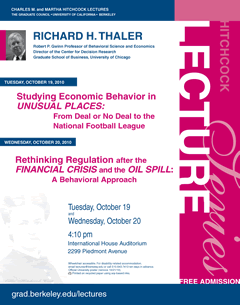
Richard H. Thaler
Robert P. Gwinn Professor of Behavioral Science & Economics, and Director of the Center for Decision Research, Graduate School of Business, University of Chicago
Charles M. and Martha Hitchcock Lectures
October 20, 2010 — 4:10 PMInternational House Auditorium — 2299 Piedmont Avenue, Berkeley
About The Lecture This lecture considers the public policy implications of behavioral economics. The premise of behavioral economics is that both the regulated and the regulators are fallible. How best then to devise laws and institutions to create a prosperous … Continued
International House Auditorium - 2299 Piedmont Avenue, Berkeley Berkeley Graduate Lectures [email protected] false MM/DD/YYYYAbout The Lecture
This lecture considers the public policy implications of behavioral economics. The premise of behavioral economics is that both the regulated and the regulators are fallible. How best then to devise laws and institutions to create a prosperous and just society? Lessons from recent events will play a part in the lecture which will also draw on Thaler’s best-selling book Nudge.
This is the second of two lectures presented by Richard H. Thaler. The first lecture, Studying Economic Behavior in Unusual Places: From Deal or No Deal to the National Football League, takes place on Tuesday, October 19, 2010.
About Richard H. Thaler
Richard Thaler is renowned for his extremely influential contributions to the emerging field of behavioral economics over the last three decades. He is considered by many to be the pioneer in integrating psychological research with economic theory and the inventor of the field of behavioral economics. Thaler’s studies also focus on behavioral finance and the psychology of decision-making. He explores the implications of loosening the standard economic assumption that everyone in the economy is rational and selfish, instead considering the possibility that some of the participants in the economy are sometimes human.
In the News
-
- 2017 Nobel in Economics is Awarded to Richard Thaler (The New York Times)